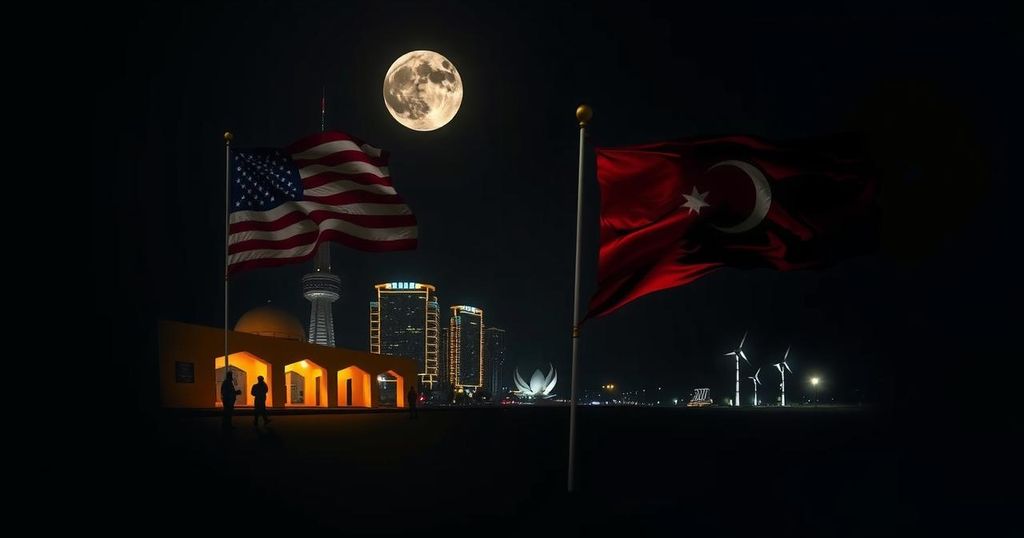Global news
AFRICA, ASIA, BBC, BENJAMIN NETANYAHU, BIDEN, CEASEFIRE NEGOTIATIONS, CEASEFIRE TALKS, CONFLICT, DEFENCE, EGYPT, EUROPE/ASIA, H A HELLYER, HAMAS, HOSTAGE NEGOTIATIONS, HUMANITARIAN CRISIS, IRAN, ISMAIL HANIYEH, ISRAEL, MILITARY OPERATIONS, NATO, OBAMA, REUTERS, ROYAL UNITED SERVICES INSTITUTE, RUSI, TALIBAN, TURKEY, US, YO, YOAV GALLANT
Marcus Li
0 Comments
U.S. Declares It Will No Longer Accept Hamas Presence in Qatar
Senior U.S. officials assert that no Hamas representatives will be tolerated in Qatar following allegations of their rejection of ceasefire proposals. Recent reports suggest Qatar has consented to pressure Hamas to vacate its political office. As diplomatic negotiations falter, the Biden administration seeks to broker a peace deal before the term’s end, exploring potential alternatives for Hamas’s political base, potentially in Turkey, amid increasing geopolitical complexities.
Senior United States officials have indicated a significant shift in their policy regarding Hamas, declaring that the U.S. will no longer tolerate the group’s presence in Qatar. This development follows allegations that Hamas has dismissed recent proposals aimed at establishing a ceasefire in Gaza and reaching a hostage agreement. Ten days ago, the Qatari government reportedly agreed to direct Hamas to close its political office in Doha. Hamas has maintained a political presence in Qatar since 2012, with the original intention being to facilitate communication with the group, as reportedly requested by the Obama administration. Hamas officials have denied these claims; Qatar has yet to issue an official comment. As a vital U.S. ally in the Gulf region, Qatar hosts a significant American air base and has mediated delicate negotiations involving various entities, including Iran and the Taliban. Despite their involvement, recent talks led by Qatar, alongside the U.S. and Egypt, have yielded little success in achieving a ceasefire in the ongoing conflict between Israel and Hamas. Hamas has been firm in its demands for a complete cessation of hostilities and the total withdrawal of Israeli forces from Gaza. Concurrently, accusations have surfaced against Israel, claiming that they too have rejected potential peace deals. Political analysts suggest that the U.S. push for Hamas’s expulsion from Doha corresponds with a broader strategy by the Biden administration to secure a peace agreement prior to the end of its term. Should Hamas be compelled to leave Qatar, Turkey may serve as a plausible alternative for their political operations. This would allow them relative safety and access to diplomatic channels in a NATO member state, a sentiment reinforced by previous interactions between Turkey’s President Recep Tayyip Erdoğan and Hamas leadership. Recent events, including the assassinations of key Hamas figures, have raised concerns regarding the safety of its leadership. Addressing the disarray within Hamas, expert Dr. H A Hellyer hypothesizes that the group is preparing to relocate, underscoring the precarious balance they maintain amidst hostilities. The U.S. administration’s frustrations with the Israeli approach toward peace negotiations have also become increasingly evident, with indications that Washington will impose consequences should Israel fail to enhance the humanitarian conditions in Gaza. The relationship between President Joe Biden and Prime Minister Benjamin Netanyahu has further strained due to escalating tensions and differing approaches to the Gaza conflict. As the political landscape shifts with the potential return of former President Donald Trump, who is perceived to be more supportive of Israeli actions, the U.S. may find its influence in Israel waning. In conclusion, however the situation unfolds, the U.S. appears willing to exert pressure on Hamas as a means of forging a potential peace agreement, contingent upon Qatar’s cooperation as a longstanding ally.
The backdrop of this situation is the ongoing conflict between Israel and Hamas, particularly over achievements of a ceasefire and addressing humanitarian crises in Gaza. Since the beginning of the year-long war, multiple attempts at negotiating peace have ultimately failed, with both parties refusing to compromise adequately on key issues. Qatar’s role has been significant as both a host for Hamas and as a mediator in peace discussions, due to its geographical and political positioning as a U.S. ally in the region. With the anticipated transition of power to a potentially less diplomatic U.S. administration, the dynamics surrounding Hamas’s operations in Qatar have drawn scrutiny and the need for decisive actions.
In summary, the U.S. position regarding Hamas’s presence in Qatar reflects a significant diplomatic shift aimed at addressing ongoing conflicts in the region. The Biden administration’s insistence on expelling Hamas from Doha signifies an urgency to secure a peace deal prior to the presidential transition. The implications of such a move could redefine regional alliances and determine the future operational grounds for Hamas, as well as solidify Qatar’s strategic role in Middle Eastern geopolitics. As tensions persist, the future of U.S.-Israel relations and humanitarian conditions in Gaza remain at a critical juncture.
Original Source: www.bbc.com




Post Comment